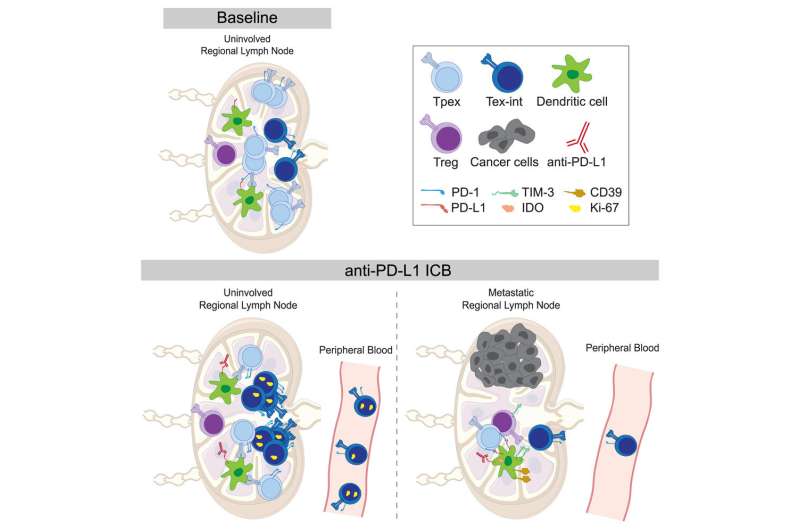This article has been reviewed according to Science X's editorial process and policies. Editors have highlighted the following attributes while ensuring the content's credibility:
fact-checked
peer-reviewed publication
trusted source
proofread
Can lymph nodes boost the success of cancer immunotherapy?

Cancer treatment routinely involves taking out lymph nodes near the tumor in case they contain metastatic cancer cells. But new findings from a clinical trial by researchers at UC San Francisco and Gladstone Institutes shows that immunotherapy can activate tumor-fighting T cells in nearby lymph nodes.
The study, published in Cell, suggests that leaving lymph nodes intact until after immunotherapy could boost efficacy against solid tumors, only a small fraction of which currently respond to these newer types of treatments. Most immunotherapies are aimed only at reinvigorating T cells in the tumor, where they often become exhausted battling the tumor's cancer cells.
But the new research shows that allowing the treatment to activate the immune response of the lymph nodes as well can play an important role in driving positive response to immunotherapy.
"This work really changes our thinking about the importance of keeping lymph nodes in the body during treatment," said Matt Spitzer, Ph.D., an investigator for the Parker Institute for Cancer Immunotherapy and Gladstone-UCSF Institute of Genomic Immunology and senior author of the study. Lymph nodes are often removed because they are typically the first place metastatic cancer cells appear, and without surgery, it can be difficult to determine whether the nodes contain metastases.
"Immunotherapy is designed to jump start the immune response, but when we take out nearby lymph nodes before treatment, we're essentially removing the key locations where T cells live and can be activated," Spitzer said, noting that the evidence supporting the removal of lymph nodes is from older studies that predate the use of today's immunotherapies.
Aim for the lymph nodes, not the tumor
Researchers have largely been working under the assumption that cancer immunotherapy works by stimulating the immune cells within the tumor, Spitzer said. But in a 2017 study in mice, Spitzer showed that immunotherapy drugs are actually activating the lymph nodes. "That study changed our understanding of how these therapies might be working," said Spitzer.
Rather than the immunotherapy pumping up the T cells in the tumor, he said, T cells in the lymph nodes are likely the source for T cells circulating in the blood. Such circulating cells can then go into the tumor and kill off the cancer cells. Having shown that intact lymph nodes can temper cancer's hold in mice, Spitzer's team wanted to know whether the same would prove true in human patients. They chose to design a trial for patients with head and neck cancers because of the high number of lymph nodes in those areas.
The trial enrolled 12 patients whose tumors hadn't yet metastasized past the lymph nodes. Typically, such patients would undergo surgery to remove the tumor, followed by other treatments if recommended. Instead, patients received a single cycle of an immunotherapy drug called atezolizumab (anti-PD-L1) that is produced by Genentech, a sponsor of the trial. A week or two later, Spitzer's team measured how much the treatment activated the patients' immune systems.
The treatment also included surgically removing each patient's tumor and nearby lymph nodes after immunotherapy and analyzing how the immunotherapy affected them. The team found that, after immunotherapy, the cancer-killing T cells in the lymph nodes began springing into action.
They also found higher numbers of related immune cells in the patients' blood. Spitzer attributes some of the trial's success to its design, which allowed the team to get a lot of information from a small number of patients by looking at the tissue before and after surgery and running detailed analyses.
"Being able to collect the tissue from surgery shortly after the patients had been given the drug was a really unique opportunity," he said. "We were able to see, at the cellular level, what the drug was doing to the immune response." That kind of insight would be challenging to get from a more traditional trial in patients with later-stage disease, who would not typically benefit from undergoing surgery after immunotherapy.
Metastases inhibit immune response
Another benefit of the study design was that it allowed researchers to compare how the treatment affected lymph nodes with and without metastases, or a second cancer growth. "No one had looked at metastatic lymph nodes in this way before," said Spitzer. "We could see that the metastases impaired the immune response relative to what we saw in the healthy lymph nodes."
It could be that the T cells in these metastatic nodes were less activated by the therapy, Spitzer said. If so, that could explain, in part, the poor performance of some immunotherapy treatments. Still, the therapy prompted enough T-cell activity in the metastatic lymph nodes to consider leaving them in for a short period of time until treatment ends.
"Removing lymph nodes with metastatic cancer cells is probably still important but taking them out before immunotherapy treatment may be throwing the baby out with the bathwater," said Spitzer. A subsequent goal of the current trial is to determine whether giving immunotherapy before surgery protects against the recurrence of tumors in the future. Researchers won't know the answer to that until they've had a chance to monitor the participants for several years.
"My hope is that if we can activate a good immune response before the tumor is taken out, all those T cells will stay in the body and recognize cancer cells if they come back," Spitzer said. Next, the team plans to study better treatments for patients with metastatic lymph nodes, using drugs that would be more effective at reactivating their immune responses.
More information: Maha K. Rahim et al, Dynamic CD8+ T cell responses to cancer immunotherapy in human regional lymph nodes are disrupted in metastatic lymph nodes, Cell (2023). DOI: 10.1016/j.cell.2023.02.021



















